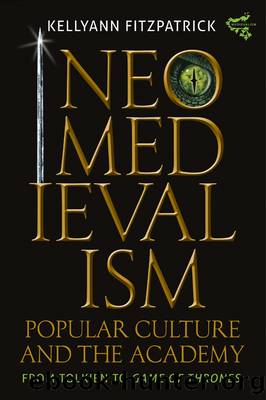Neomedievalism, Popular Culture, and the Academy by KellyAnn Fitzpatrick;

Author:KellyAnn Fitzpatrick;
Language: eng
Format: epub
Publisher: Boydell & Brewer
4
Game of Thrones: Neomedievalism and the Myths of Inheritance
D AENERYS TARGARYEN is one of the main protagonists in George R. R. Martinâs series of neomedieval fantasy novels A Song of Ice and Fire and its HBO television series adaption Game of Thrones.1 Daenerys appears at the beginning of both series as one of the last known legitimate members of house Targaryen, a noble family from the continent of Essos who had conquered the Seven Kingdoms of the continent of Westeros 300 years earlier. The conquest was purportedly achieved with the aid of dragons, which the Targaryen family could ride into battle and harness as powerful weapons; at the start of the series, however, dragons are extinct, the Targaryens have lost the throne in an uprising over a decade earlier, and Daenerys lives in exile in Essos. Dragons have faded almost into myth until Daenerys, ostensibly through magic tied to fire, blood, and her own inherited abilities, hatches three fossilized dragon eggs and raises the hatchlings into full-size dragons that become key in her own bid to take back the Seven Kingdoms.
The above example illustrates the complex relationship between inheritance and myth in the A Song of Ice and Fire and Game of Thrones series, suggesting a world in which myth may not always stay myth and where blood inheritance is important. It is also a useful starting point for examining how neomedieval fantasy relies on versions of the medieval that it has inherited from sources including medieval history, medieval myth, and later medievalist and neomedieval interpretations. For instance, dragons in A Song of Ice and Fire and Game of Thrones â and, as we saw in the last chapter, Maleficent â are aligned with a series protagonist and are thus a far cry from the dragons-as-antagonist trope that we see in Tolkienâs The Hobbit or Disneyâs Sleeping Beauty, a trope with roots tracing back to medieval myth and literature itself, as we saw in both the Anglo-Saxon poem Beowulf and its interpretations.2 As Rikke Schubart observes:
Dragons are heavily invested in meaning. In Western mythology, they are monsters to be slain. Ancient Rome used them as a sigil on banners, claiming the strength of dragons at war. In Norse mythology, they were bestial adversaries slain by the hero Beowulf. And to medieval Christianity, the dragon symbolized the devil as slain by Saint George. Campbell reads dragons as symbols of internal fears and desires relating to the father that the hero must kill. In a reversal of tropes, however, dragons have become friends and pets, as viewed in such movies as Dragonheart (1996), How to Train Your Dragon (2010), and How to Train Your Dragon 2 (2014; in the last title women even get to ride dragons, too).3
Download
This site does not store any files on its server. We only index and link to content provided by other sites. Please contact the content providers to delete copyright contents if any and email us, we'll remove relevant links or contents immediately.
The Cross and the Curse (The Bernicia Chronicles Book 2) by Harffy Matthew(92536)
Icehenge by Kim Stanley Robinson(56613)
Sita - Warrior of Mithila (Book 2 of the Ram Chandra Series) by Amish(54863)
Crystal Cove by Lisa Kleypas(39085)
The Conquerors (The Winning of America Series Book 3) by Eckert Allan W(37389)
The Crystal Crypt by Dick Philip K(36856)
In Control (The City Series) by Crystal Serowka(36217)
The Crystal Egg by Wells H.G(35594)
The Wolf Sea (The Oathsworn Series, Book 2) by Low Robert(35237)
We Ride Upon Sticks by Quan Barry(34514)
Crowbone (The Oathsworn Series, Book 5) by Low Robert(33605)
The Book of Dreams (Saxon Series) by Severin Tim(33368)
Cecilia; Or, Memoirs of an Heiress — Volume 1 by Fanny Burney(32546)
Cecilia; Or, Memoirs of an Heiress — Volume 2 by Fanny Burney(31945)
Cecilia; Or, Memoirs of an Heiress — Volume 3 by Fanny Burney(31930)
Evelina by Fanny Burney(26866)
Fanny Burney by Claire Harman(26597)
Evelina, Or, the History of a Young Lady's Entrance into the World by Fanny Burney(26278)
Beautiful Disaster by McGuire Jamie(25324)
